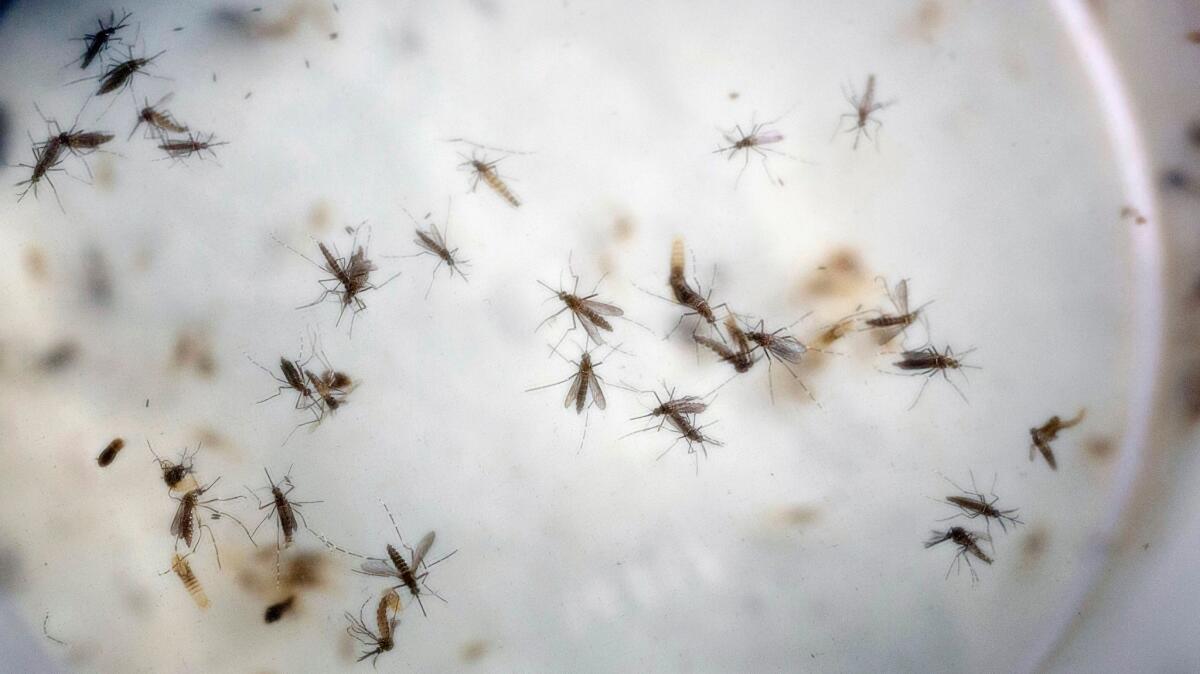After 3 months, Congress is ready to act on Obama’s Zika call

- Share via
Reporting from Washington — Congress is ready to act on President Obama’s long-stalled request for emergency funds to combat the Zika virus, which has been linked to serious birth defects and other major health problems.
House Republicans have unveiled a $622-million measure to battle the Zika virus, offering Obama just one-third of the money he requested almost three months ago.
The measure by Kentucky Republican Harold Rogers is scheduled for a vote this week.
The legislation provides funding for developing a vaccine, controlling the mosquitoes that spread Zika, tests to detect the virus and international mosquito control.
The bill is financed by cuts to unspent funding passed in 2014 to battle Ebola, as well as leftover funding at the Department of Health and Human Services.
The Senate is scheduled to vote on several competing Zika proposals Tuesday, with a $1.1-billion bipartisan plan likely to get a green light in a procedural vote.
Here are things to know about Zika and the government’s efforts to battle it:
The dangers of Zika
For adults, the Zika virus can cause relatively mild symptoms such as fever, rash and joint pain. But during pregnancy, Zika can cause a serious birth defect called microcephaly and other severe fetal brain defects, as well as eye problems, hearing deficits and impaired growth. Zika is commonly spread by mosquitoes and can also be contracted through sexual contact.
The Centers for Disease Control and Prevention recommends that pregnant women not travel to areas with Zika and, if they live in a Zika area, to strictly follow steps to prevent mosquito bites and to prevent sexual transmission.
Zika is likely to spread more widely during the summer mosquito season, but officials say outbreaks in the U.S. are likely to be limited. The South is likely to have the most cases because the mosquitoes that can transmit Zika are more prevalent there.
To date, there have been more than 500 cases of Zika in the continental U.S., all of which have been associated with overseas travel.
Last week, the first Zika-related microcephaly case acquired on U.S. soil was reported in Puerto Rico, a U.S. territory. The island’s health secretary said a fetus turned over by an unidentified Puerto Rican woman to U.S. health officials had severe microcephaly and tested positive for Zika.
What is the government doing to fight Zika?
There is currently no vaccine or medical treatment for Zika. The government is working to develop a vaccine and better tests for Zika and is delivering funding to state and local governments to control the mosquitoes that spread it.
The Obama administration has transferred almost $600 million in previously appropriated funding to anti-Zika efforts, such as research on the virus and Zika-related birth defects, response teams to limit Zika’s spread and aid to other countries fighting the virus. Most of the money used has come from unspent funds from the $5 billion provided in 2014 to battle Ebola.
The administration says more money is needed for mosquito control, purchasing diagnostic tests and developing and manufacturing a vaccine.
The battle before Congress
Obama made his $1.9-billion request almost three months ago. Republicans say he has padded the request, for instance with a $246-million request for Medicaid funding for Puerto Rico. Democrats complain of GOP foot-dragging.
Republicans have slated action for this week, starting Tuesday. Senate Majority Leader Mitch McConnell (R-Ky.) has scripted three votes, with Obama’s request and a GOP alternative likely to fall short of the 60 votes required to turn back a filibuster.
A $1.1-billion bipartisan alternative, however, is expected to advance despite grumbling by Democrats who think it’s not enough and conservative Republicans who believe it should be offset with spending cuts elsewhere in the budget. The Zika funds would be attached to a separate spending bill for the departments of Transportation, Veterans Affairs, and Housing and Urban Development that McConnell hopes can be finalized for Obama’s signature before Congress goes on vacation in mid-July.
The House, meanwhile, promises action this week on the $622-million stand-alone Zika measure. The outlines of a final compromise are unclear.
ALSO
Rule change may expand government surveillance powers, privacy advocates say
Australia will give its Olympic athletes condoms designed to stop spread of Zika virus
Supreme Court ruling should clear the way to free birth control for women with religious employers
More to Read
Sign up for Essential California
The most important California stories and recommendations in your inbox every morning.
You may occasionally receive promotional content from the Los Angeles Times.













